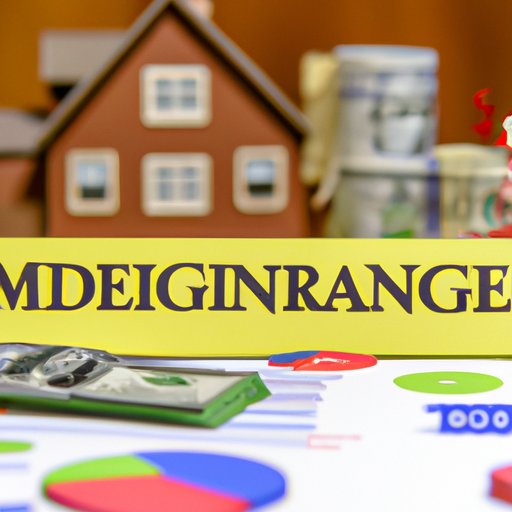Introduction
Buying a home is one of the biggest purchases you’ll make in your life, so it’s important to understand how much you can afford. Home affordability is the amount of money you can spend on a home without overextending your finances. Knowing your budget will help you narrow down your search and find the right house for you.
Calculating Your Home Budget: How Much Can You Afford?
Before you start looking for a home, it’s important to understand your current financial situation. This includes evaluating your income, expenses, debts, and savings. By understanding your finances, you can determine how much you can realistically afford when buying a home.
The first step is to estimate the cost of the home. Start by researching housing prices in the area you want to live in. This will give you a good idea of what to expect when it comes to home prices. Once you have an estimate of how much the home will cost, you can calculate your monthly mortgage payments.
Your mortgage payments should not exceed 28% of your gross monthly income. To calculate your mortgage payment, you will need to know the loan amount, the interest rate, and the length of the loan. You can use an online calculator or speak to a lender to get an accurate estimate of your payments.

A Guide to Finding the Right Home for Your Budget
Once you’ve determined your budget, you can start looking for a home. Research different neighborhoods to find out which ones fit your lifestyle and budget. Compare prices of different homes in the area to get an idea of what you can afford. Don’t forget to factor in other costs such as taxes, insurance, and maintenance.
When you’ve found a few homes that meet your criteria, it’s time to move onto the next step: getting pre-approved for a loan. Pre-approval is when a lender evaluates your financial information to determine how much you can borrow. This will give you a better idea of what you can afford and help you narrow down your choices.
What Can You Afford When Buying a Home?
When calculating how much home you can afford, lenders look at two key factors: your debt-to-income ratio and the type of loan you are applying for. Your debt-to-income ratio is the amount of debt you have compared to your gross income. Most lenders want your debt-to-income ratio to be below 43%. The type of loan you choose can also affect how much home you can buy.
Conventional loans typically require a higher down payment than government-backed loans. If you have enough money saved for a large down payment, you may be able to qualify for a conventional loan and buy a more expensive home. On the other hand, if you don’t have a lot of cash saved up, you may need to consider a government-backed loan with a lower down payment.
Analyzing Your Finances to Find Out How Much Home You Can Buy
In addition to your debt-to-income ratio and loan type, there are several other factors that lenders consider when determining how much home you can afford. These include your credit score, employment history, and cash reserves. Lenders may also look at your current assets and liabilities.
When analyzing your finances, it’s important to calculate your debt-to-income ratio. This is done by adding up all of your monthly debts including car payments, student loans, and credit card payments. Then divide this number by your gross monthly income. The resulting number is your debt-to-income ratio.
You should also consider how much money you can put down on a home. Generally, lenders prefer a down payment of 20% or more. However, some loans allow for lower down payments. Understanding closing costs and other associated fees can also help you determine how much home you can afford.

Tips for Maximizing Your Home Purchase Within Your Budget
Once you’ve determined how much home you can afford, it’s time to start shopping around. Shop around for the best interest rates to ensure you are getting the best deal possible. Negotiating with sellers can also help you maximize your budget. Finally, make sure you are getting the most bang for your buck by comparing features and amenities between different homes.
Conclusion
Buying a home is a major decision and it’s important to understand your budget before you start the process. Calculating your debt-to-income ratio, determining how much money you can put down on a home, and considering other costs such as taxes, insurance, and maintenance can help you figure out how much home you can afford. Shopping around for the best interest rates, negotiating with sellers, and making sure you are getting the best deal are all great ways to maximize your home purchase within your budget.
(Note: Is this article not meeting your expectations? Do you have knowledge or insights to share? Unlock new opportunities and expand your reach by joining our authors team. Click Registration to join us and share your expertise with our readers.)
